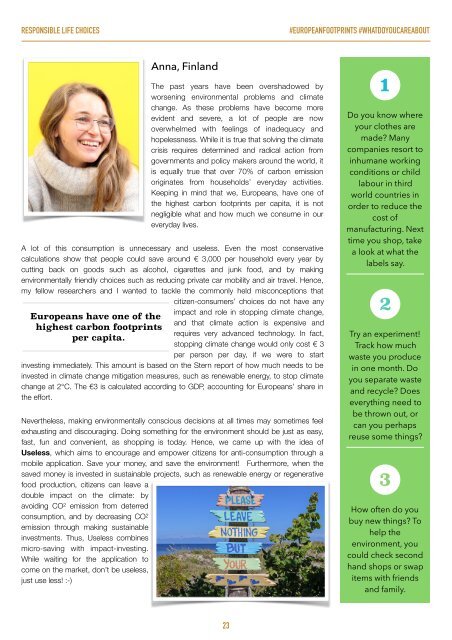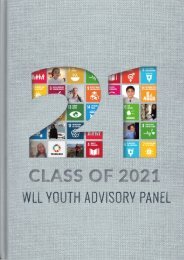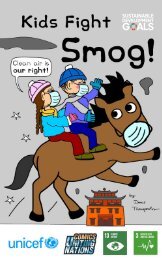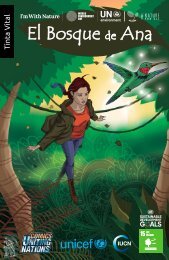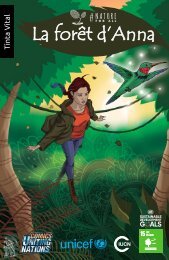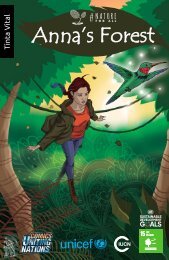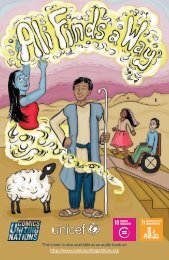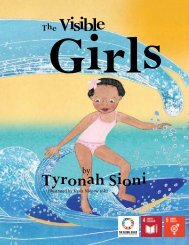Stories For A Sustainable Future
A teaching tool to be used in classrooms, addressing 13-18 year old students created by European Footprints Initiative. The storybook can be used as a whole, as it presents a general introduction on the SDGs, as well as thematically.
A teaching tool to be used in classrooms, addressing 13-18 year old students created by European Footprints Initiative. The storybook can be used as a whole, as it presents a general introduction on the SDGs, as well as thematically.
Create successful ePaper yourself
Turn your PDF publications into a flip-book with our unique Google optimized e-Paper software.
RESPONSIBLE LIFE CHOICES<br />
#EUROPEANFOOTPRINTS #WHATDOYOUCAREABOUT<br />
Anna, Finland<br />
The past years have been overshadowed by<br />
worsening environmental problems and climate<br />
change. As these problems have become more<br />
evident and severe, a lot of people are now<br />
overwhelmed with feelings of inadequacy and<br />
hopelessness. While it is true that solving the climate<br />
crisis requires determined and radical action from<br />
governments and policy makers around the world, it<br />
is equally true that over 70% of carbon emission<br />
originates from households’ everyday activities.<br />
Keeping in mind that we, Europeans, have one of<br />
the highest carbon footprints per capita, it is not<br />
negligible what and how much we consume in our<br />
everyday lives.<br />
A lot of this consumption is unnecessary and useless. Even the most conservative<br />
calculations show that people could save around € 3,000 per household every year by<br />
cutting back on goods such as alcohol, cigarettes and junk food, and by making<br />
environmentally friendly choices such as reducing private car mobility and air travel. Hence,<br />
my fellow researchers and I wanted to tackle the commonly held misconceptions that<br />
citizen-consumers’ choices do not have any<br />
Europeans have one of the<br />
highest carbon footprints<br />
per capita.<br />
impact and role in stopping climate change,<br />
and that climate action is expensive and<br />
requires very advanced technology. In fact,<br />
stopping climate change would only cost € 3<br />
per person per day, if we were to start<br />
investing immediately. This amount is based on the Stern report of how much needs to be<br />
invested in climate change mitigation measures, such as renewable energy, to stop climate<br />
change at 2°C. The €3 is calculated according to GDP, accounting for Europeans’ share in<br />
the effort.<br />
Nevertheless, making environmentally conscious decisions at all times may sometimes feel<br />
exhausting and discouraging. Doing something for the environment should be just as easy,<br />
fast, fun and convenient, as shopping is today. Hence, we came up with the idea of<br />
Useless, which aims to encourage and empower citizens for anti-consumption through a<br />
mobile application. Save your money, and save the environment! Furthermore, when the<br />
saved money is invested in sustainable projects, such as renewable energy or regenerative<br />
food production, citizens can leave a<br />
double impact on the climate: by<br />
avoiding CO 2 emission from deterred<br />
consumption, and by decreasing CO 2<br />
emission through making sustainable<br />
investments. Thus, Useless combines<br />
micro-saving with impact-investing.<br />
While waiting for the application to<br />
come on the market, don’t be useless,<br />
just use less! :-) <br />
1<br />
Do you know where<br />
your clothes are<br />
made? Many<br />
companies resort to<br />
inhumane working<br />
conditions or child<br />
labour in third<br />
world countries in<br />
order to reduce the<br />
cost of<br />
manufacturing. Next<br />
time you shop, take<br />
a look at what the<br />
labels say.<br />
2<br />
Try an experiment!<br />
Track how much<br />
waste you produce<br />
in one month. Do<br />
you separate waste<br />
and recycle? Does<br />
everything need to<br />
be thrown out, or<br />
can you perhaps<br />
reuse some things?<br />
3<br />
How often do you<br />
buy new things? To<br />
help the<br />
environment, you<br />
could check second<br />
hand shops or swap<br />
items with friends<br />
and family.<br />
23


